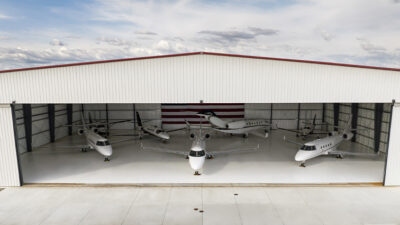Train for you!

Hello, summer! With the COVID vaccine now readily available, the demand for travel is bringing back air traffic and the empty skies of 2020 will soon be a piece of aviation history. As we dust off our flight bags or update the iPad applications, be mindful that skill loss, albeit temporary, is a reality we need to contend with.
As you walk out to pre-flight this summer, consider the importance of knowing not only your own, but also your copilot’s, current proficiency level because a lot has changed. Airlines grounded airplanes and simultaneously offered early retirements, which caused training centers to back up as pilots awaited classes to either return to flying or learn new aircraft types entirely. Corporate operators saw an increased demand for service and were one of the few employers who provided new flying jobs. Flight schools not only had career-minded students enrolled, but a new wave of aviators who want to learn to fly for the personal freedom.
All of this brings to mind the adage, “What’s old is new again,” and 2021 is going to be the year of training. Break out your checklists, QRH, and POHs because this is the time to do some personal assessments.
Becoming Inspired
Opportunity to step outside my comfort zone came for me when the airline I work for sought volunteers to take some time off. I took a short break from the airlines and ventured out to the local regional airport to get back to general aviation, reacquainting myself with the joys of personal aircraft ownership (a beautiful Comanche and Cessna 172) and making friends with anyone who had an open hangar door.
During the COVID shutdown, I did my first barrel roll, my first landing on water, and received a tail wheel endorsement. There has been a mile-long smile on my face for months and it is a reminder that learning new skills is not only necessary to become a well-rounded pilot, but it is a blast! I implore you to break up with the monotony of straight-and-level flying and extend your skill envelope.
Changing the Paradigm
This concept gave me pause. What if training occurred every quarter instead of every six months or every year? My training department at work might cover the cost, but if not, I could certainly take care of my own proficiency by challenging myself with a unique flying experience.
Loss of Control Inflight (LOC-I), along with human error tied to the physiological startle response, contributes to the total number of fatalities in aviation each year.1 It is not only something presented to pilots and aircrew, it is something that lawyers, insurance providers and risk managers address regularly.2 Each group, although from a different department and unique perspective, seeks to mitigate the LOC-I threat.
Changing the training paradigm benefits pilots, aircrew, passengers and all personnel supporting the organizational safe flying objective. The status quo is not enough, and I can attest to that as I am currently living it.
The Sky Is Our Classroom
Prioritize yourself this summer and the professional development required to not only make you “current,” but proficient in an office where you have been spending less time. Proficient is defined as “well advanced in an art, occupation, or branch of knowledge.”3 As professionals, we need that definition associated with our names and our resumes to reflect that dedication.
Training does not always have to be about passing the check ride. It can be opening your aperture in our classroom in the sky! Seek new challenges at your local airport, surround yourself with like-minded individuals and add something new to your flying resume.
Be the pilot that feels so comfortable in the aircraft that you can put your crew resource management to the test and coach someone out of a bad situation. Whether it is countering LOC-I or another airborne emergency, the summer school investment in yourself is priceless.
Resources
1 Loss of Control Inflight. National Business Aviation Association. Retrieved June 30, 2021 from https://nbaa.org/aircraft-operations/safety/in-flight-safety/loss-of-control-in-flight/.
2 The Most Common Causes of Aviation Accidents. (8 December 2020). The National Law Review. Retrieved June 30, 2021 from https://www.natlawreview.com/article/most-common-causes-aviation-accidents.
3 Proficient. Merriam-Webster. Retrieved on June 30, 2021 from https://www.merriam-webster.com/dictionary/proficient.

Prevailance Aerospace is a UPRT provider that has been working with corporate, government, and general aviation pilots to improve safety in the aviation industry. Prevailance Aerospace uses Extra 300 Series Aircraft for training and our pilots are experienced aviation professionals from various military and general aviation backgrounds. We know that successful aviation endeavors are accomplished through an uncompromising commitment to safety, impeccable professionalism, tremendous attention to detail, and constant improvement.
http://prevailanceaerospace.com
© 2025 Prevailance Aerospace. All Rights Reserved.
Next ArticleRelated Posts

Emerging Security Threats in Business Aviation: Activism and Down-Route Risks
Security incidents affecting business aviation do not need to involve violence to have an operational impact. A protest delaying crew movements, blocking access to a hangar or resulting in an unauthorized photograph of a sensitive client can all trigger reputational, financial or compliance concerns for operators.

Navigating Geopolitical Uncertainty Using Business Aviation
Bigger business jets mean bigger fuel tanks, longer trips, more border crossings, and bigger wallets! With an equipment upgrade also comes the requirement for a knowledge upgrade.

